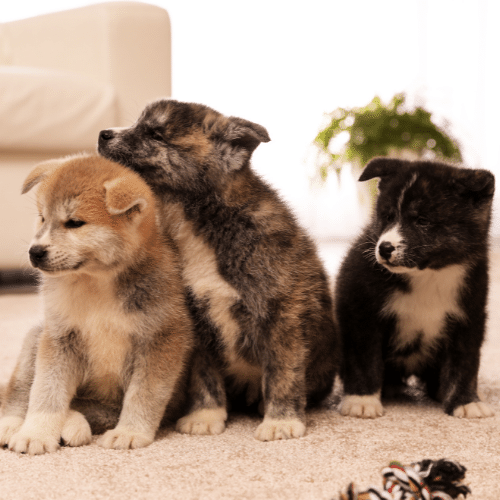Dogs are social creatures, which is one reason why they get along so well with people. As a result, they’re not always comfortable being alone.
Loud crying, excessive barking, domestic mishaps, and other undesirable behaviors are some separation anxiety symptoms.
Fortunately, with some dog separation anxiety training, positive reinforcement, and some patience from their human companions, puppies can learn to feel comfortable with their alone time.
Understimulation & separation anxiety in puppies
As was already mentioned, canine separation anxiety can be exacerbated by under-stimulation. However, it’s crucial to avoid over-exerting your dog as this can harm their developing bones. How then can we ensure that our puppies are sufficiently stimulated without overworking them?
Until they reach adulthood, puppies typically require 5 minutes of exercise every month of their age, twice daily. Consequently, a 4-month-old puppy requires 20 minutes of exercise twice daily, a 5-month-old puppy requires 25 minutes of exercise twice daily, etc. Some puppies have so much energy, though, that it might seem like this isn’t enough to wear them out.
Try to visit different locations and engage in diverse activities, such as hiking, running, swimming, and fetch games with various toys, to make walks as stimulating as possible. Include your dog as much as you can in your family activities, and engage with as many welcoming individuals and canines as you can while out for walks to prevent loneliness.
The best way to help dogs cope with anxiety is probably to engage their minds through play. Games like hide-and-seek and treasure hunt are perfect for dogs who have mastered the fundamentals of training. Ask them to remain seated while you hide somewhere in the house to play hide and seek. Then, call them to come find you. Follow the same guidelines as hide and seek, but instead hide your dog’s favorite toy or some treats to play treasure hunt.
You can make almost anything into a game with young puppies, but instinct-based games like fetch, chase, and tug are always firm favorites. They enjoy everything that involves images, sounds, movements, and water.
In fact, for dogs who need a good mental workout, games and toys that stimulate the senses are ideal. Puzzle toys are great for older dogs who need some enrichment, but younger puppies might find them to be a little too complex. Try simple treat-dispenser balls, slow feeders, and snuffle mats instead because they function equally well.
Chewing is a great stress-buster, too. Therefore, make sure to give your dog durable chew toys and treats. Given that they are nutritious, tasty, and hardy while still being soft enough for baby teeth and even soothing for sore gums, frozen carrots are ideal for both heavy chewers and teething puppies.
If you’ve completed all of your puppy’s fundamental training, try putting their minds to the test even more by teaching them some entertaining tricks using our dog tricks course. The wave, roll over, spin, handstand, and leg weaving are common moves.

Is separation anxiety normal in puppies?
Most puppies will initially experience some separation anxiety, but this is normal and should pass with time. But mild anxiety is not the same as severe separation anxiety, which must be treated because it is unhealthy. Nevertheless, it is relatively common, affecting 14% of dogs in the US.
Separation anxiety may be preventable with proper socialization and training when a puppy
Puppy Behavior and Training – Socialization and Fear Prevention for more information on how to properly socialize puppies with both people and other animals. Puppies must learn to enjoy their own company and play with their toys when they are left alone. Make sure to only get your puppy when he is peacefully playing with his toys when you bring him out of his alone time to interact with the family. Reward the behaviors that you want your puppy to continue. A puppy with good adjustment will do well alone or with the family and is less likely to experience separation anxiety in the future.
FAQ
Do puppies grow out of separation anxiety?
Unfortunately, puppies don’t just get over their anxiety when they’re separated from their owners. Thankfully, it’s not too difficult to treat and just requires a little TLC and training. If you don’t treat it, it’ll probably just get worse, and it definitely won’t get any better!
How do I stop my puppies separation anxiety?
- Crate Training. A crate is both your dog’s friend and your ally, as is worth emphasizing again.
- Desensitization and Counter-Conditioning. …
- Exercise. …
- Clinginess – Playing it Cool. …
- Medication and Natural Supplements.
Does my puppy have separation anxiety or is he just a puppy?
Excessive barking or howling when left alone are signs of puppy separation anxiety. Chewing and other undesirable behaviors. Accidents occurring around the house, though this may be age-related and not a sign of separation anxiety Scratching or digging at doors or windows.